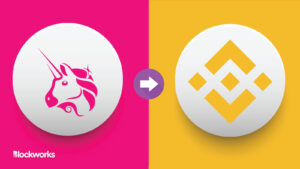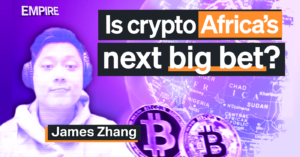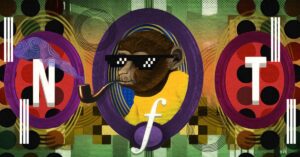- ConsenSys is building out its white-label NFT platform and is in talks with luxury and sports brands
- Company’s executive director of strategic initiatives details a potential future of “non-fungible everything”
ConsenSys is seeking to use NFTs as a way to onboard the next wave of users into its main product, Metamask, as the company expects the segment to greatly broaden over time.
“We’ve aligned around a north star to bring the next tens of millions of users into Metamask through NFTs,” Johnna Powell, ConsenSys’s executive director of strategic initiatives, told Blockworks.
Developed by ConsenSys, MetaMask is a mobile app and browser extension that functions as a cryptocurrency wallet for interacting with the Ethereum blockchain. The offering reported roughly 21 million monthly active users in November.
NFTs have quickly dwarfed the former focus on DeFi, according to Tyler Mulvihill, ConsenSys’s co-head of global NFTs. NFT sales hit nearly $20 billion in 2021 compared to less than $100 million the year prior, according to Cryptoslam.
“They are fun, culturally relevant and a perfect playground to educate people about the promises of Web3,” Mulvihill said in an email.
“We plan on accelerating this journey using NFTs as a way to bring people into Web3 through purchasing and custody on MetaMask.”
In addition to looking to add Metamask users through NFTs, Powell noted the company’s focus on its white-label NFT platform.
ConsenSys acquired blockchain company Treum and its NFT platform in October to advance its NFT technology offering for creators, brands, rights owners, game publishers, sports teams and leagues.
The company is currently in talks with one large brand owner in the luxury market and several in the sports realm, Powell explained.
“People are finally seeing that there are ways that you can own something digitally, and it’s provable, and it’s authentic and it’s immutable — and that didn’t exist before,” Powell explained.
The future of NFTs
Powell highlighted the opportunities for NFTs beyond collectibles, noting that a person’s resume, medical records or driver’s license could be NFTs.
“We’re looking at this very narrow niche area, but we see a broad world opening up that could be essentially non-fungible everything,” she said.
“It’s just a far more efficient way to track records, to track anything you need to track provenance for.”
ConsenSys is also particularly interested in the financialization of NFTs and is exploring collateralization, fractionalization, swapping, borrowing and lending in the segment.
“Traditionally illiquid and infrequently traded assets like NFTs were hard to price,” Mulvihill noted. “By solving this problem, it allows people to borrow against their NFTs by collateralizing them.”
NFT platform Arcade matches blockchain art owners with prospective lenders, accepting collateral ranging from plots of virtual land to blue-chip collections such as Bored Ape Yacht Club and CryptoPunks.
Such a pricing fix would also enable people to swap NFTs more easily, Mulvihill added.
Some investors wanting access to popular NFT collections, such as Bored Ape Yacht Club, CryptoPunks and World of Women, cannot afford the price such non-fungible tokens are commanding.
CryptoPunk #5822 sold for about 8,000 ETH, worth about $23.7 million, on Feb. 12, according to Larva Labs.
With the mainstream becoming priced out of popular NFT collections, there will be increased demand to fractionalize NFTs and participate in the upside by owning a piece of one.
“We think all of that is on the horizon,” Powell said. “None of it is really truly here yet, but we see it coming in the next one or two years.”
Get the day’s top crypto news and insights delivered to your inbox every evening. Subscribe to Blockworks’ free newsletter now.
- 000
- 2021
- 7
- About
- accelerating
- access
- According
- active
- addition
- advisors
- All
- app
- AREA
- around
- Art
- asset
- asset management
- Assets
- Authentic
- avatar
- before
- Billion
- blockchain
- Borrowing
- brands
- browser
- Building
- club
- collectibles
- collections
- coming
- company
- Company’s
- compared
- ConsenSys
- could
- creators
- crypto
- Crypto News
- cryptocurrency
- Cryptocurrency Wallet
- Custody
- decentralized
- Decentralized Finance
- decentralized finance (DeFi)
- DeFi
- Demand
- digital
- Digital Assets
- digitally
- Director
- easily
- editor
- efficient
- ETH
- ethereum
- Ethereum blockchain
- everything
- executive
- Executive Director
- expects
- Finally
- finance
- financial
- Fix
- Focus
- Free
- fun
- functions
- fund
- funds
- future
- game
- Global
- here
- Highlighted
- HTTPS
- increased
- insights
- integration
- Intelligence
- Investors
- IT
- journalism
- journey
- Labs
- large
- leagues
- lending
- License
- local
- Long
- looking
- Macro
- Mainstream
- management
- Market
- Maryland
- medical
- MetaMask
- million
- millions
- Mobile
- Mobile app
- more
- news
- Newspapers
- NFT
- NFTs
- non-fungible tokens
- North
- offering
- Onboarding
- opening
- opportunities
- owner
- owners
- participate
- People
- perfect
- piece
- platform
- Popular
- price
- pricing
- Problem
- Product
- Products
- publishers
- purchasing
- quickly
- ranging
- records
- reporter
- resume
- Said
- sales
- seeking
- sold
- something
- Sports
- Sports Teams
- Strategic
- Talks
- Technology
- Through
- time
- Tokens
- top
- track
- traditional
- traditional finance
- university
- University of Maryland
- use
- users
- various
- Virtual
- Wallet
- Wave
- Web3
- Women
- world
- worth
- would
- year
- years













